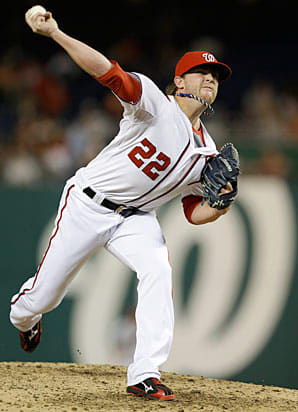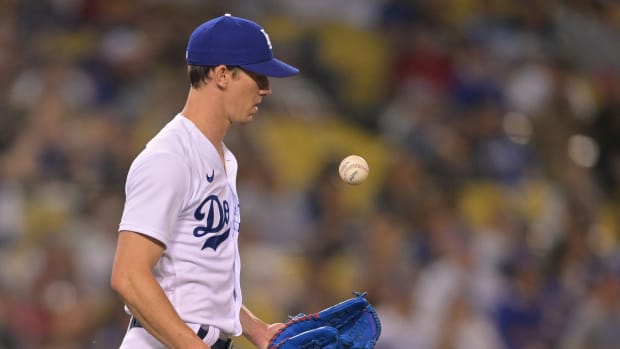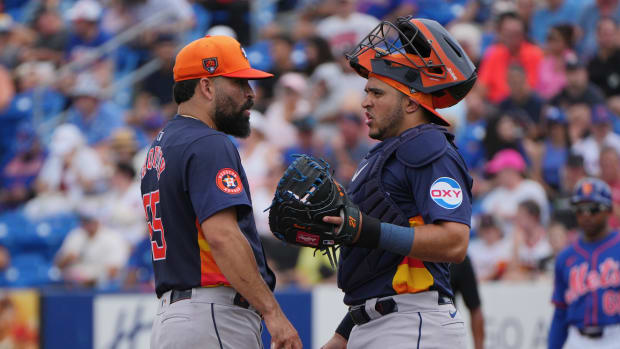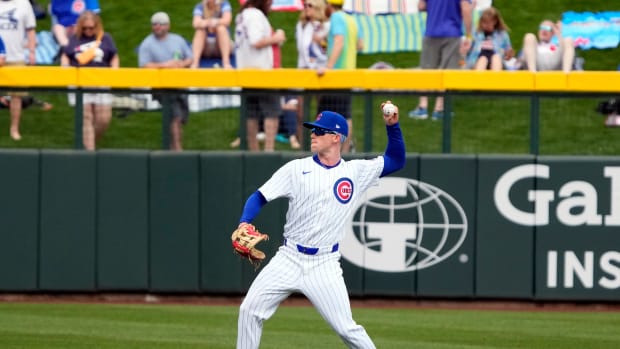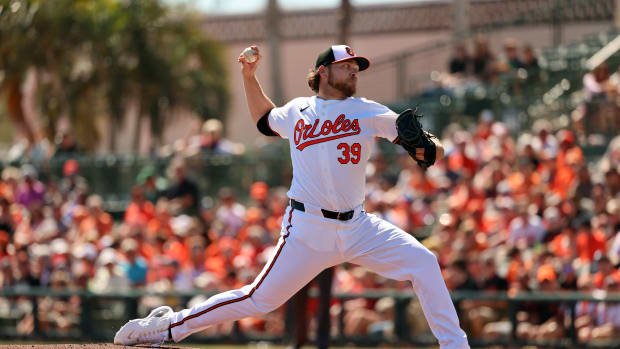The agonizing and amazing feeling of watching my son, Drew Storen
On the hospital room TV, I was watching the Cubs struggle in Philadelphia. Jamie Moyer was not pitching particularly well, and my thought was that he wasn't going to be a big leaguer for long. It was Aug. 10, 1987. My wife, Pam, wasn't into the game. She didn't particularly like baseball. The fact that she had been in labor for over eight hours might have also played a role. I felt guilt in my soul. It was I who had urged her to delay the delivery of our baby past the first due date of July 25 if she could. She hadn't exactly adored my explanation that the Little League age deadline fell on Aug. 1.
The morning of Aug. 11 came. After an induced labor, allergic reactions to medications, a ton of tears shed (mostly by me) and stunning forceps work by a female obstetrician with biceps the size of Jose Canseco, our 8 pound, 10 ouncer inked a long term deal with the bottom of his feet. We waited to see him to judge if the name we picked would fit. It did. He would never be booed in his life. He would always be able to say the fans weren't booing, they were "Dreeewwwwing." Drew Patrick Storen made his first career appearance.
And now, the radio voice of the Dodgers, Charlie Steiner, is explaining to his audience that the 30,000 fans in Nationals Park on Sept. 20 aren't booing, they're chanting "Drew, Drew." Charlie mentions that Drew Storen's dad is me, Mark Patrick, a radio and television sportscaster (my full name is Mark Patrick Storen). That acknowledgement only heightens my overwhelming feelings of nausea. While being the father of a major league closer is a joyful experience, it is also terrifying. The Nationals are three outs away from clinching their first ever playoff appearance. And it will fall upon the right arm of my son to get the job done.
Steiner, an old friend of mine, declares that in order to get the save, Storen will have to retire Matt Kemp, Adrian Gonzalez and Hanley Ramirez. My wife has retreated to her watching spot in our bedroom. I am overseeing my usual media setup in the hearth room: the radio broadcast from MLB.com on my computer, the MLB Extra Innings package on the TV and fear in my heart. Pam learned long ago that we did better watching separately, and seemingly, so does our boy.
It was a raw Indiana evening in April of 1993. As the sports director of the CBS television affiliate in Indianapolis, I anchored the 5 and 6 p.m. newscasts, then usually headed home to eat dinner before returning to deliver the 11 p.m. scores and highlights. After dinner, Drew and I would head outside to play baseball. Drew would usually be wearing one of the 30 authentic MLB jerseys that Santa had delivered for Christmas, and I would be in my shirt and tie, hitting fungoes, playing catch and throwing batting practice with my TV hair refusing to billow in the breeze.
On this night, though, I was headed to a small elementary school. My five year- old had just finished his first organized T-Ball practice! As I spotted Drew, he was trudging toward me with drooping shoulders. What could have possibly gone wrong? "Dad, I'm the only switch-hitter on my team, so the coach said I could only take BP from one side of the plate, or I would get to hit twice as much as the other kids." He was disgusted. His dad was beaming.
Matt Kemp dug in from the right side batters box. He had put up MVP numbers in 2011, and his early production in 2012 had him trending toward the award, until injuries derailed his season. On the mound, the low, flat-brimmed hat of Drew Storen covered steel blue eyes that pierced the night with a ferocity meant for situations like these. Drew had also dealt with injury. After never missing a game in his life because of injury, he was forced to sit the first three months of this season after surgery to remove bone spurs in his elbow. No one cared that he had been one of baseball's elite closers in 2011, finishing with 43 saves. It is a game of now. And at this moment, 60-feet, 6-inches away, one of the best power hitters alive was waggling his bat.
I was doing my laps around the room. I had always been able to watch Drew while sitting, until he played at Stanford. Once he began closing in his freshman season, I needed to be alone...standing...pacing. In his final collegiate game against Oregon State, he was called upon for an achingly long eight-out save. I paced. He pitched. . . and got eight strikeouts. I haven't sat down since.
Matt Kemp doesn't care about college numbers. He has run the count to 3-and-2. Now, my computer is blinking. The tweets are starting. "Storen better throw strikes." I wish I could actually see the faceless who find their courage in 140- character doses. Kemp scares me. He doesn't scare my son. A 95- mph fastball paints the corner for strike three. The crowd erupts. Two outs from history. They're not booing. . . .
"A murderer's row of Dodgers here in the top of the ninth." Bob Carpenter was calling the play-by-play on the MASN telecast, and his description made my already nervous stomach feel as if it were Cheese Whiz. "That's strike one to Adrian Gonzalez." A 95-mph sinker, down in the zone. Strike one. It always makes me feel better. A little. It sounds corny, but I can sense when Drew is on, and on this night, his sinker is darting and diving. His slider is sharp. My son calls himself an "adrenaline junkie." There's no doubt a situation like this is his fix.
Gonzalez stares at my kid, searching for any sign of weakness. Hitters can sense any breakdown in the confidence of a closer. Two more sinkers and the count is 1-and-2. I am muttering to the screen, "Throw the change..." Nationals' color analyst F.P. Santangelo has another thought, "Three down and away sinkers, do you come back right here with the slider?" F.P. knows the slider is Drew's best out pitch. Bob Carpenter calls it, "The Killer Slider." It was the last pitch to come back to Drew after his surgery. The audible electricity of the fans becomes louder. Drew always feeds on this. I clench both fists to watch.
Watching on TV, or sometimes in person, it feels surreal. Drew is still my boy. I know I'm supposed to look under that cap with the curly W and see a 25 year old. But I don't. I still see the face that begged me to let him pitch when he was eight. The face that always wore the look of his feelings. It has evolved now to the face that stares intently, emotionless now, at his catcher, Kurt Suzuki, for the sign. "Swing and a miss, STRIKE THREE! Change up. I mean if you have the confidence to go to that pitch against that hitter in that situation...Drew Storen is back, folks."
In 2005, Drew's sophomore season, his Brownsburg High School team was 35-0, the Indiana state champions and ranked No. 2 in the country for 2005. Drew wasn't even the team's No. 1 starter. Even I knew the team's ace was much better than my 5-foot-9, 130-pound son. That kid was a senior, 6-foot-5, 230 pounds. He threw hard. He had big curve. He was Lance Lynn. Ask somebody in St. Louis how he did after high school.
By this time, I was doing the morning show on the MLB Network at XM Satellite Radio. My partners were former major leaguers Buck Martinez and Larry Bowa. Buck's reputation around baseball was gold, but I did not know what to expect from Bo when we started working together. Turns out, I could not have been luckier to be around two of the best baseball minds in the world. Bo even came to Indianapolis to play in my charity golf outing. While he was in town, he spoke to Drew's high school team as they approached the state tournament. He told them of his world championship with the 1980 Phillies and the lifelong bonds formed among his teammates. He explained to the boys that if they won, they would be linked with one another no matter where their futures took them.
Then Bo took extra time to watch Drew and Lance throw bullpens. There he was, arms crossed, just watching. As they finished, he looked at me, gave me a Larry Bowa sneer and shook his head. My heart sank. "Didn't think that's what I'd see after you talked 'em both up so much." Great. I knew absolutely nothing about baseball, and Larry Bowa was about to tell me so. "Got two future big leaguers right there."
I figured he must be just being polite so that he could get out of there. Turns out, Bo knows. Earlier that spring, Bo and I had been broadcasting our show in Ft. Myers, Fla., at Red Sox camp. Bo was running a verbal baseball clinic as we watched the Red Sox take infield one morning. Everyone's eyes were trained on shortstop Edgar Renteria, who had just signed with Boston in the off-season. But I just loved this tall, thin minor leaguer who was taking ground balls fifth in line behind Renteria. I asked Bo if he'd seen him. "Hanley Ramirez. He's gonna be better than all of 'em."
Hanley Ramirez, for so many years a tormentor of the Washington Nationals, stands in the way." Bob Carpenter wasn't making me feel better. The steel rods which used to be my back and neck muscles become even tighter. "That's a front door breaking ball for a strike."
The stadium crowd takes it up another notch. The television picture shows fans turning, posing for pictures as the historic moment unfolds behind them. I take two careful sips of my Lipton Diet Citrus Flavored Green Tea. It doesn't reduce the starchy feel of my cotton mouth.
Drew is set for his second offering to Ramirez. Ramirez struck out on a hard fastball away in his last appearance against Drew, and he looks to be sitting fastball. Drew and Suzuki are on the same page: slider. It's a beautiful bender that stuns Ramirez for a called strike two. Bob and F.P. don't say a word on the telecast before or after the pitch. They are laying out, the term for letting the action speak for itself. The crowd's reaction is telling the tale.
I never imagined, in my wildest dreams, I would be watching my son in a moment like this. And very few could fully understand the depth of his mental toughness, what he had endured in the past week. As my feet slid along the wood floor, I felt the tears welling in my eyes as I thought of it.
"Drew set for the pitch. And Ramirez steps out...."
Dean Nelson embodied the Greatest Generation. It wasn't easy to get him to talk about his experiences fighting under Gen. Patton in the Battle of the Bulge. But it was easy for Dean to talk of his grandkids. Especially Drew Storen. Drew had made Dean and his wife, Ruth, very proud. Why, he had gone to Stanford out of high school instead of signing with the New York Yankees! As proud grandparents, they thought this to be a good choice. A choice that meant they would no longer be able to support their grandson in person, but would instead follow his games through the newspaper and magazine articles their daughter Pam would provide. Ruth would always grab the sports section of the paper first every morning, and share with Dean the news about their grandson. In June of 2011, Ruth lost her battle with Parkinson's Disease.
Drew pitched twice with a heavy heart in Chicago, appearances wrapped around his grandma's death and funeral. Dean was lost without his wife of 63 years. As he neared the end of his life this September, the Nationals were leaving New York after beating the Mets on a Wednesday night. Drew stayed behind and took an early flight out of LaGuardia to Indianapolis. He stayed at Dean's side for several hours and also visited his other grandfather, Pat Storen, who suffers from Parkinson's. Drew caught the flight for Atlanta which departed Indianapolis at 6:50 p.m. He got the news when he called home upon landing. His grandpa had died at 6:51. Had he waited to go until after he saw his grandson?
After pitching a perfect inning against the Braves on Sunday night, Drew flew back to D.C. with the team, arriving home at 4:30 a.m. He caught a 7 a.m. flight for the Indianapolis funeral of his grandfather before returning to D.C. that night. I honestly thought the heavy travel and burden of grief might take their toll when my boy hit the bump. How could he focus? If Drew does succumb to the pressure here, you can bet we won't see any sympathetic posts on Twitter. . .
Charlie Slowes and Dave Jageler are calling the game on the Nationals' Radio Network. I listen on MLB.com as their description runs about two full seconds ahead of what I see on my TV screen. This way, I already know what I'm about to see. I know, it makes no sense, but somehow it helps me. Charlie has been with the team from day one in D.C., and he's likely called more losses than any play-by-play voice in that span. Understandably, he's sounding pretty excited. "Listen to this crowd here at Nationals Park. I think it'll make some hair stand up on your arms. Storen ready... oh and two... Ramirez digs in... and time is called. Ramirez will reset... Storen the set, top of the ninth, oh and two, two out, nobody on. The pitch... SWING AND A MISS! HE STRUCK HIM OUT WITH A SLIDER!!"
I can't believe it, yet I can. I keep thinking he must feel the same raging anguish in his appearances that I do. Because, you know, he's my son. But there he is, on TV, acting like it's no big deal. Doesn't he realize he just struck out the side? I hear his mom back in the bedroom; she's yelping. Our Westie is barking at Pam's rare show of emotion. My cell phone is starting to buzz. Of course I saw it! Nationals. Playoffs. First. Time. Ever. The crowd is going bonkers. And they really, seriously, are not booing.































